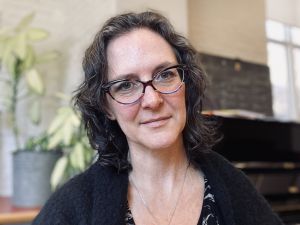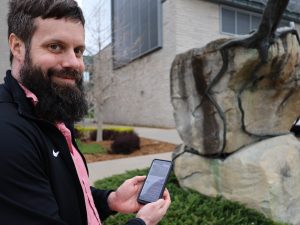Transitioning to university can be highly stressful for many students, especially those away from home and on their own for the first time. That experience has only been compounded by the ongoing global pandemic, which has heightened academic, social and emotional challenges.
Matthew Kwan, Assistant Professor in Brock’s Department of Child and Youth Studies, is studying if and how an innovative virtual community program called Archway can support and connect first-year university students.
The Canadian Institutes of Health Research (CIHR) has awarded Kwan $156,000 for this research under CIHR’s COVID-19 Mental Health & Substance Use Service Needs and Delivery program.
“It’s exciting because we’re able to assess this program that was developed specifically as a response to COVID-19, but at the same time, the implications of this work extend well beyond this year and this cohort,” says Kwan.
“This is an opportunity for us to really re-think and re-shape the way we deliver support to students and optimize student mental health and well-being,” says Kwan, who came to Brock in July from McMaster University in Hamilton.
The research is an extension of Kwan’s work at McMaster, which is home to the Archway program.
The program seeks to: connect students to the wider McMaster University community; provide support in the areas of academics, social-emotional learning and health and well-being; and retain students by assisting with their academic success.
Each first-year student is assigned an Archway coach, an employee in the Student Affairs Office who helps them navigate and access university services, and a mentor, who is a paid upper-year student providing additional supports from the perspective of a student.
The incoming student is placed in an online community with around 35 other first-year students grouped together by an area of interest such as sports, gaming or cooking.
Coaches and mentors organize and guide two sessions a month on topics such as study tips, coping with meeting deadlines and developing social connections through drop-in study groups, book clubs and other activities.
Kwan’s research on the Archway program involves two studies.
In the first, Kwan and his team at McMaster University will use the Canadian Campus Well-being Survey (CCWS) – which he was “intimately involved in setting up” – to measure Archway participants’ well-being, resiliency, depression, anxiety, sense of belonging, social isolation and academic support, along with answers to questions from the Canadian Student Tobacco, Alcohol and Drugs Survey.
The CCWS is an assessment tool that aims to assist Canadian post-secondary institutions to better support student health and well-being.
The team will be doing comparisons between an initial, baseline survey and follow-up surveys; Archway participants and non-participants; and the current survey and one conducted in March 2020 just before COVID-19 hit.
In the second study, Kwan and his team will be conducting online interviews with Archway participants for a close, detailed look at their thoughts, experiences and insights related to the program as well as the thoughts and experiences of non-participants.
Kwan says his team’s research project, “Evaluation of Archway: A Guided Program for First-Year Student Success and Mental Health and Well-being,” can set the stage for future mental health interventions across institutions.
“The COVID-19 situation was the impetus to get us thinking more about what we can do in a virtual environment, which is probably more in line with what students want these days anyway,” says Kwan.
“The program itself is not going to take away from face-to-face support structures that have been or will continue to be in place, but this research will help us understand what can be complementary and effective. This will be important as this virtual world is ubiquitous with younger people these days.”
Traditional mental health programs have tended to only focus on depression and anxieties, says Kwan, but the Archway program — and the team’s research — will also try to understand positive mental health attributes as well as loneliness and a sense of belonging.
CIHR’s $10.2 million COVID-19 Mental Health & Substance Use Service Needs and Delivery program was launched in June to support research on acute mental health and/or substance use needs of individuals, communities and/or populations due to COVID-19 and how to better match mental health and/or substance use services to those who need them.










